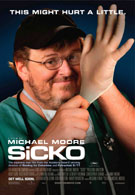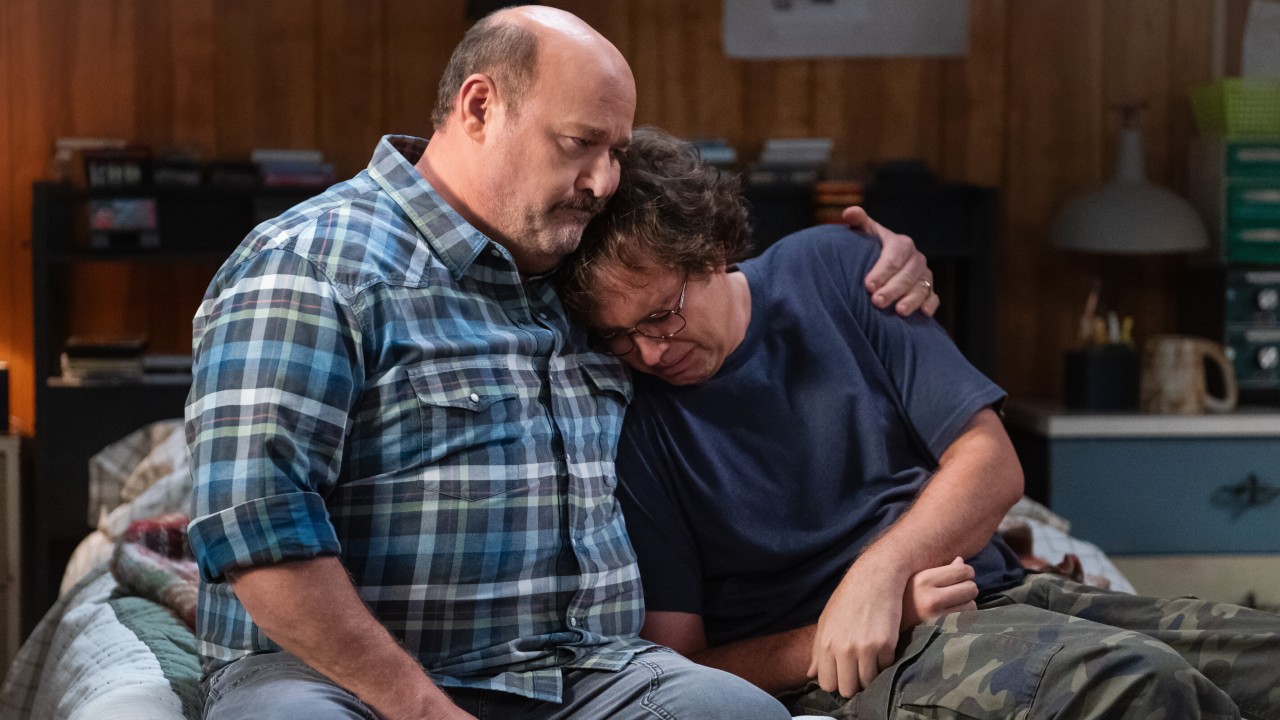Sicko is a return to ‘TV Nation’/Roger and Me era Michael Moore, when he was a rabble rouser who used to stand up for the little guy and tackled big issues with humor and wit instead of overbearing doom and gloom voice-overs, end of the world music, and other manipulative movie magic. Maybe he learned his lesson after the divisive reactions to Fahrenheit 9/11, or maybe this material simply lends itself more to an evenhanded style. Whatever the reason, for Sicko Moore keeps the dirty tricks to a minimum and instead states his case for desperately needed healthcare reform by making his movie about me and about you. Unlike his previous films this is not a movie of anger and outrage as much as it is disappointment and dismay, in which Moore serves as your escort through the story of a system gone bad and a nation mired in self-imposed suffering.
Sicko is not a movie about the 50 million Americans walking around without health insurance. Sicko is a movie about the other 250 million of us who have insurance, but are just as well and truly screwed. It’s also about freedom, real freedom, not the empty kind that gets thrown around as a buzzword; the freedom to live your life with the certainty that forces beyond your control won’t take away everything you have and everything you are. We don’t have that kind of freedom here in America, and Moore’s film makes that point by simply talking to real people. They’re your neighbors, your friends, your parents, some of them are even 9/11 heroes. Moore uses his camera to let them tell their stories of insurance company mistreatment and in the process paints a complete picture of a corrupt and fatally flawed system which isn’t just killing people but taking away their dignity and their liberty.
At first, he isn’t telling us anything we don’t already know. Anyone who’s spent any time dealing with insurance companies knows what a mess it is. You pay your premiums and then when you actually need them they go out of their way not to help you. They’re in the business of finding reasons not to spend money, and everyone knows it. What you may not know is just how far they’ll go. Having insurance doesn’t mean you’re protected, and the film covers both ends of the spectrum from people left to die because insurance companies refuse treatment, to people dropped from policies for bogus reasons, to an elderly couple driven to bankruptcy and made homeless by high deductibles. The film leaves no room for anyone to think it won’t happen to them. It will. It happens to everyone, just in varying degrees. When you walk out of Sicko, you’ll do it with the absolute certainty that if you ever encounter serious health trouble, you’re screwed.
Moore doesn’t stop with exposing how badly our health system is broken. Everyone knows it’s broken. The point of the film is that it doesn’t have to be that way. He takes it the next step further by exploring how to fix it, and he does that by going to other countries that have solved the problem. Again, he avoids getting lost in political agenda pushing and instead takes to the street and simply talks to real people in other places where healthcare is free, to anyone and everyone. In doing so, he systematically tears down every myth we’ve ever been fed about government run universal healthcare and leaves you with the question: why the hell aren’t we doing this?
Amidst all the facts and anecdotes Sicko manages to tell the engaging, moving, and sometimes hilarious story of a country and a people in crisis. The reason it works so well is that first and foremost it’s about you. It’s impossible not to relate to, since it’s a movie about the common fears we all face. Sicko is being billed as Michael Moore’s expose of the healthcare industry, but in a much broader sense it’s the story of how we as a people have lost control over our own way of life. It isn’t an unbiased documentary, it’s more of a two-hour positioning statement, but it states its point of view in a straightforward and honest way while still cutting right to the emotional core of the problem.
Moore can’t completely contain himself, and the film does occasionally slip into the shifty manipulation that’s been the hallmark of his other, more recent work. The difference here is that when it does so, more often than not it’s played for wry comedic effect, rather than subtle fear-mongering. The stories the film tells will move you, the truth it uncovers will piss you off. In between the laughter and the tears, it’s an intensely effective, gut-wrenching experience and one of the best movies of any kind you’ll see this year. More than that, Sicko is a desperately important film, one which is less concerned with telling you who to vote for than it is with simply getting you to wake up, see through the bullshit, and step out of line.
Your Daily Blend of Entertainment News


